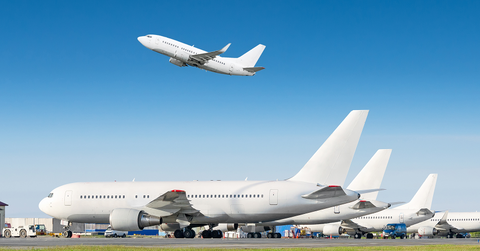737 MAX: American, United Extend Cancellations Again
Two major US airlines that own Boeing’s (BA) 737 MAX planes have pulled the model from their schedules until early December.
Sept. 2 2019, Updated 9:08 a.m. ET

Two major US airlines that own Boeing’s (BA) 737 MAX planes have pulled the model from their schedules until early December. The 737 MAX aircraft has been facing a worldwide flying ban since mid-March following two fatal accidents within five months of one another.
Airlines extended 737 MAX cancellations
The first extension of the MAX flight cancellation announcement came from United Airlines on August 30. The airline pushed the grounding of its Boeing 737 MAX planes back through December 19, Reuters reported on August 30. The announcement marks the fourth time in the last five months United has extended the flight cancellation period.
The airline currently owns 14 Boeing MAX planes. Following the Ethiopian Airlines crash on March 10, United canceled all of its MAX flights through early July. Later, it stretched the MAX grounding to August 3, then to September 3, and then to November 3. The extended period for the MAX grounding will result in over 9,500 flight cancellations for the company since mid-March.
American Airlines followed in United’s footsteps. On September 1, it announced that it would keep its 737 MAX fleets grounded until December 3. The move marks the fifth time in the five months American has extended the grounding period of said planes. The airline first canceled all MAX flights until April 24. Later, it stretched the MAX grounding to June 5, then to August 19, then to September 3, and then to November 2.
American Airlines currently owns 24 MAX planes. Earlier, the company said that the MAX grounding would result in 115 daily flight cancellations until November 2. However, it now expects 140 daily flight cancellations in November. The higher number of cancellations is mainly the result of the airline’s being expected to receive new deliveries of MAX planes. The company’s total number of MAX planes is supposed to reach 40 units from the current 24.
Southwest Airlines (LUV), the largest MAX customer among US carriers, has already extended its MAX flight cancellations until January 5, 2020. The airline owns 34 Boeing 737 MAX planes.
737 MAX grounding is hurting airlines
The MAX grounding has caused thousands of flight cancellations for the three major US airlines. Massive flight cancellations are affecting these companies’ financial results. American Airlines recorded a total of 7,800 flight cancellations due to the MAX grounding in the second quarter. As a result, its total capacity fell 0.8% YoY (year-over-year) in the quarter. Though the airline’s quarterly revenue was in line with analysts’ expectations, its YoY growth rate of 2.7% was significantly lower than the 5% increase it had recorded in all four quarters of 2018.
Similarly, United Airlines faced nearly 3,440 flight cancellations in the second quarter. Its quarterly revenue came in slightly ahead of Wall Street’s estimates. However, its YoY growth rate remained in the mid-single-digit range compared to the high-single-digit increase it had registered in the previous five quarters.
Southwest Airlines had faced over 20,000 flight cancellations since mid-March as of the second quarter’s end. The company’s second-quarter revenue fell short of analysts’ expectations. Its YoY revenue growth of 2.9% was much lower than the 5% increase it had recorded in the previous three quarters.
According to an August 6 OAG report, the three airlines have suffered massive capacity losses due to the MAX grounding. OAG is a leading digital airline information and data provider. American, United, and Southwest will lose approximately 6.34 million seat capacities combined if MAX planes remain grounded until October, according to OAG estimates. The report also states that the cost of MAX fiasco to US carriers could reach $4 billion if the planes remain grounded throughout October.
Uncertainty looms over 737 MAX returns
Uncertainty over the 737 MAX’s return to the skies still looms, as the FAA (Federal Aviation Administration) has toughened the approval process. According to an August 22 Reuters report, the FAA is putting together a test crew that will include at least two pilots from each MAX customer. For this, the regulatory body has asked MAX customers to send two pilots who have flown MAX aircraft at least once in the last 18 months.
Further, Boeing hasn’t fixed the software problem associated with MAX’s flight-control system yet. The company expects to fix it by September’s end and hopes to receive regulatory approval in October. However, the FAA and other global aviation regulatory bodies will need a few weeks to review the software fix. After that, airlines will also need a few weeks to make the necessary maintenance work and pilot training. Therefore, we likely shouldn’t expect MAX’s return before December.
Airline stocks’ YTD performances
Airline stocks have had a rough ride so far this year. The iShares Transportation Average ETF (IYT) has underperformed the broader market YTD (year-to-date). The ETF has allocated nearly 20.5% of its funds to the passenger airline industry. IYT has gained 10.6% YTD, while the Dow Jones and the S&P 500 are up 13.2% and 16.7%, respectively.
The industry has continued to grapple with negative news throughout the year. US airlines faced multiple business disruptions due to the partial government shutdown and unfavorable weather conditions at the beginning of the year. Later, the flying ban on Boeing’s MAX planes caused massive flight cancellations for American, United, and Southwest. Escalating US-China trade war and concerns over a global economic slowdown have also kept investors increasingly cautious about airlines’ growth prospects.
